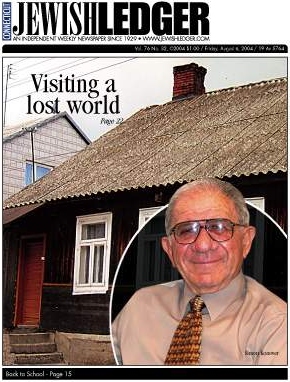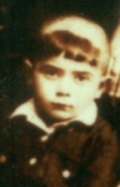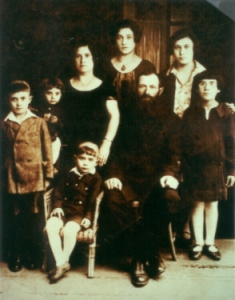|
|

|
|
Simon Konover [born Shimon Chunowicz].
His father Hershel Chunowicz was from Makow,
his mother Gittel Sawicka was from
Radzilow. There were three marriages involving Chunowicz from Makow and
Sawicki from Radzilow. |
|
| |
|
Aug 6, 2004 -
Since he arrived in Hartford in 1949, Simon Konover has become a
nationally known real estate developer and philanthropist. His company,
Konover Properties Corporation, has built and operated more than 200
developments throughout the East Coast, including more than 100 shopping
centers.
|
|
|
|
 |
|
Shimon Chunowicz |
|
|
| |
|
Yet despite his huge success in America, Konover, a survivor of the
Holocaust, has never forgotten his roots in the "old country."
For a long time, Simon, his wife, Doris, and their family have talked
about taking a trip back to Poland, where Simon grew up.
This past May, Simon's granddaughter Karen Kleinman finally said, "It's
now or never n let's go."
Thirteen members of the Konover clan, including Konover's 2½-year-old
great-grandchild and a pregnant Karen, went on the journey to Poland and
then traveled on to Prague.
With a private guide, the four generations toured the big cities of Warsaw
and Krakow and Lublin. They visited the concentration camps. And they made
a pilgrimage to Simon's hometown of Makow.
There, he pointed out
to his children and grandchildren where his family (their name was Chunowicz,
later changed in America to Konover) used to live, although the house is no
longer standing. He showed them where he lost fingers in an accident at a well.
Strolling around the town, Simon found the town hall, where an unfriendly clerk
wouldn't engage him in conversation. However, she did give him his birth
certificate, although Konover has doubts about its authenticity.
The village looks worse than when he left 65 years ago and is no longer the busy
place he remembered.
"There was no traffic, no business, nothing," recalls Konover in an interview in
his comfortable West Hartford office. "As a businessman, I thought, 'This town
could use some business.'"
"It's a lost world," mused Konover. "How could this happen? There was a vibrant
Jewish culture and now...there is nothing."
From Makow, the group stopped at the memorial in Jedwabne, the site where
hundreds of Jews were slaughtered by their Polish neighbors in 1941.
Next, they visited Radzilow, where Simon's mother was from. Konover showed his
family the site in the marketplace where the Germans rounded up the Jews.
While Konover didn't encounter any familiar faces in Radzilow, he did meet an
elderly man who remembered his relatives --- the Sawicki family.
|
 |
|
Chunowicz Family, 1927
[L-R]: Chuna, Chaim, Shimon,
Gittel (nee Sawicka) Rachel, Hershel,
Chana Itka, Sheinshe
Chuna escaped through Lomza in 1939,
Pinsk 1940, Stalingrad as the Germans advanced 1941; then after
war to America; Shimon
spent 6 months in Polish labor camp 1939, escaped, met up with Chuna
in Lomza, followed same route
until sent to Siberia 1944, then eventually to
America; Chaim killed in Auschwitz, 1943; Gittel, Hershel killed in
Treblinka, 1942; Rachel killed in Treblinka, 1942; Chana killed in Radzilow, 1941; Sheinshe killed
in Makow, 1942 |
|
|
| |
|
What happened to the
Jews here? Simon asked the old man.
"There were killings," the old man replied, refusing to say any more.
In both Jedwabne and Radzilow, the group was advised by their guide to have a
security guard with them, as they sensed they "needed protection" from the
Polish townspeople, said Konover.
"We felt out of place as Jews," recalled his granddaughter. "Ironically, we
didn't need a security guard in the big cities, but in the small towns, we
sensed hostility from the townspeople."
Running From the Nazis
Konover was just 17 years old in 1939 when he was rounded up by the Germans and
sent to a labor farm to pick vegetables. There was no heat, and no water.
One night, eight of the Jews decided to try to escape. Most of them were shot on
the spot. But Konover was one of three who made it out safely.
He ran back to his home and hid. The next morning the Germans came looking for
him. He can still recall the sound of their heavy boots throughout the house as
they searched for him.
Although they didn't find him, his parents knew he wasn't safe and insisted that
he leave, so he ran away n across to the Russian section of Poland. His
14-year-old brother came with him, but decided to turn back.
Simon never saw his younger brother again.
For the next few years, Konover spent the war in the Russian army and fought in
the Battle of Stalingrad. But then he was shipped closer to Russia. He says that
if they hadn't shipped him there, he wouldn't be alive today.
In Russia, Konover worked as an automobile mechanic, repairing trucks. He was
also in charge of driving officers' wives away from the front lines. Then he was
sent to Siberia for 11 months. They let him out to go to the Polish army, but by
then, he recalls, the war was over.
After the war, he went back to Stalingrad to find another of his brothers, who
had been with him in the Russian army. Reunited, their hope was to go to
Palestine, but family members in America insisted they come here. They made
their way to the U.S. via Paris and Cuba, and in 1948 he arrived in New York
City. A year later he came to Hartford, where he would eventually become a real
estate magnate.
Lucky to Survive
This recent trip was not Konover's first time returning to Poland. Simon, Doris
and two of their three children went back 20 years ago, but had to leave quickly
when Poland declared martial law.
But this trip was more of an emotionally difficult journey for Simon. Feelings
of guilt washed over him as he visited the concentration camps.
"Maybe I could have done more to save my family," he says quietly. "When I saw
the camps, I thought, 'I was so near death.' How lucky I was that I survived."
For his granddaughter Karen, while most of Poland is "bloodshed and pain,"
visiting her grandfather's hometown was a highlight as he shared stories of his
childhood.
And now, after this trip, Karen said she realizes the importance of passing her
heritage down to her son and as yet unborn child.
"I have a responsibility to let my son know his Jewish history."
|